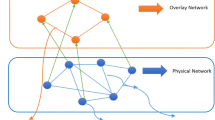Abstract
Battery-powered devices such as laptops, cell phones, and MP3 players are becoming ubiquitous. There are several significant ways in which the ubiquity of battery-powered technology impacts the field of collaborative computing. First, applications such as collaborative data gathering, become possible. Also, existing applications that depend on collaborating devices to maintain the system infrastructure must be reconsidered. Fundamentally, the problem lies in the fact that collaborative applications often require end-user computing devices to perform tasks that happen in the background and are not directly advantageous to the user. In this work, we seek to better understand how laptop users use the batteries attached to their devices and analyze a battery-aware alternative to Gnutella’s ultrapeer selection algorithm. Our algorithm provides insight into how system maintenance tasks can be allocated to battery-powered nodes. The most significant result of our study indicates that a large portion of laptop users can participate in system maintenance without sacrificing any of their battery. These results show great promise for existing collaborative applications as well as new applications, such as collaborative data gathering, that rely upon battery-powered devices.
Access this chapter
Tax calculation will be finalised at checkout
Purchases are for personal use only
Preview
Unable to display preview. Download preview PDF.
Similar content being viewed by others
References
Apple, http://www.apple.com/iphone/
Banerjee, N., Rahmati, A., Corner, M.D., Rollins, S., Zhong, L.: Users and batteries: Interactions and adaptive energy management in mobile systems. In: Krumm, J., Abowd, G.D., Seneviratne, A., Strang, T. (eds.) UbiComp 2007. LNCS, vol. 4717, pp. 217–234. Springer, Heidelberg (2007)
Burke, J., Estrin, D., Hansen, M., Parker, A., Ramanathan, N., Reddy, S., Srivastava, M.B.: Paticipatory sensing. In: World Sensor Web Workshop, Boulder, Colorado, USA (October 2006)
Chen, B., Jamieson, K., Balakrishnan, H., Morris, R.: Span: an energy-efficient coordination algorithm for topology maintenance in ad hoc wireless networks. Wirel. Netw. 8(5), 481–494 (2002)
Froehlich, J., Chen, M.: MyExperience: A system for in situ tracing and capturing of user feedback on mobile phones. In: Proc. Int. Conf. Mobile Systems, Applications, and Services (MobiSys) (June 2007)
Garces-Erce, L., Biersack, E., Felber, P., Ross, K.W., Urvoy-Keller, G.: Hierarchical peer-to-peer systems. In: Euro-Par 2003, Klagenfurt, Austria (2003)
Google, http://code.google.com/android/
Inside Higher Ed. Students ’evolving’ use of technology (September 2007), http://www.insidehighered.com/news/2007/09/17/it
Jun, H., Zhao, W., Ammar, M.H., Zegura, E.W., Lee, C.: Trading latency for energy in densely deployed wireless ad hoc networks using message ferrying. Ad Hoc Netw., 5(4), 444–461 (2007)
Kim, M., Kotz, D.: Modeling users mobility among wifi access points. In: WiTMeMo 2005: Papers presented at the 2005 workshop on Wireless traffic measurements and modeling, Berkeley, CA, USA, pp. 19–24. USENIX Association (2005)
Kotz, D., Essien, K.: Analysis of a campus-wide wireless network. Wirel. Netw. 11(1-2), 115–133 (2005)
Landsiedel, O., Götz, S., Wehrle, K.: A churn and mobility resistant approach for dhts. In: MobiShare 2006: Proceedings of the 1st international workshop on Decentralized resource sharing in mobile computing and networking, pp. 42–47. ACM, New York (2006)
Limewire, http://wiki.limewire.org/index.php?title=Ultrapeers
Lo, V., Zhou, D., Liu, Y., GauthierDickey, C., Li, J.: Scalable supernode selection in peer-to-peer overlay networks. In: HOT-P2P 2005: Proceedings of the Second International Workshop on Hot Topics in Peer-to-Peer Systems, Washington, DC, USA, pp. 18–27. IEEE Computer Society, Los Alamitos (2005)
McNett, M., Voelker, G.M.: Access and mobility of wireless pda users. SIGMOBILE Mob. Comput. Commun. Rev. 9(2), 40–55 (2005)
Mickens, J.W., Noble, B.D.: Exploiting availability prediction in distributed systems. In: NSDI 2006: Proceedings of the 3rd conference on 3rd Symposium on Networked Systems Design & Implementation, Berkeley, CA, USA, P.6. USENIX Association (2006)
Pucha, H., Das, S.M., Hu, Y.C.: Ekta: An efficient dht substrate for distributed applications in mobile ad hoc networks. In: WMCSA 2004: Proceedings of the Sixth IEEE Workshop on Mobile Computing Systems and Applications, Washington, DC, USA, pp. 163–173. IEEE Computer Society, Los Alamitos (2004)
Skype, http://www.skype.com/
Song, L., Kotz, D.F.: Evaluating opportunistic routing protocols with large realistic contact traces. In: CHANTS 2007: Proceedings of the second workshop on Challenged networks CHANTS, pp. 35–42. ACM, New York (2007)
Stutzbach, D., Rejaie, R.: Understanding churn in peer-to-peer networks. In: IMC 2006, Rio de Janeiro, Brazil (October 2006)
University of Oregon, http://engr.oregonstate.edu/students/wireless/
Zoels, S., Schubert, S., Kellerer, W., Despotovic, Z.: Hybrid DHT design for mobile environments. In: Joseph, S., Despotovic, Z., Moro, G., Bergamaschi, S. (eds.) AP2PC 2006. LNCS, vol. 4461, pp. 19–30. Springer, Heidelberg (2008)
Author information
Authors and Affiliations
Editor information
Editors and Affiliations
Rights and permissions
Copyright information
© 2009 ICST Institute for Computer Science, Social Informatics and Telecommunications Engineering
About this paper
Cite this paper
Rollins, S., Chang-Yit, C. (2009). A Battery-Aware Algorithm for Supporting Collaborative Applications. In: Bertino, E., Joshi, J.B.D. (eds) Collaborative Computing: Networking, Applications and Worksharing. CollaborateCom 2008. Lecture Notes of the Institute for Computer Sciences, Social Informatics and Telecommunications Engineering, vol 10. Springer, Berlin, Heidelberg. https://doi.org/10.1007/978-3-642-03354-4_44
Download citation
DOI: https://doi.org/10.1007/978-3-642-03354-4_44
Publisher Name: Springer, Berlin, Heidelberg
Print ISBN: 978-3-642-03353-7
Online ISBN: 978-3-642-03354-4
eBook Packages: Computer ScienceComputer Science (R0)




